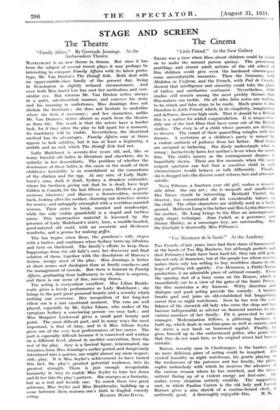"Ces Messieurs de la Sante." At the Academy THE French,
of late years, have had their share of harassment at the hands of Too Big Business, but although pockets and (last February) heads have been hard hit, they can still poke fun not only at financiers, but at the people too whose avarice makes them only too willing to buy worthless shares in the hope of getting rich quickly. Ces Messieurs, a Pathe-Natan production, is an admirable piece of satirical comedy. From the opening shot of a busy scene on the Bourse, which is immediately cut to a view of the gates of the Sante Prison, the film maintains a dry humour. Witty direction and dialogue and good acting provide the comedy. A banker breaks gaol and joins an old-established but languishing corset firm as night. watchman. Soon he has won the con- fidence of the shrewish old lady who owns the shop and has become indispensable as adviser on financial matters to the various members of her family. ITe is promoted to sales- manager. Modernization follows, a glittering business is built up, which deals in machine-guns as well as corsets, and he starts a new bank on borrowed capital. Finally, lie gives himself up to the embarrassed police, who point out that they do not want him, as his original arrest had been a mistake.
• Raimu, recently seen in Charlemagne, is the banker, and no more delicious piece of acting could be imagined. Hitt cynical humility as night watchman, his gentle playing on the weaknesses of the patronne and her family, the philo- sophic melancholy with which he receives the advances of the various women whom he has enriched, and the inter- mittent flaring up of a violent energy are first-rate. He makes every situation entirely credible. The supporting cast, in which Pauline Carton is the old lady- and Lucien Baroux gives a nice sketch of a routine-bound clerk, 4
uniformly good. A thoroughly enjoyable film. R. M.






































 Previous page
Previous page